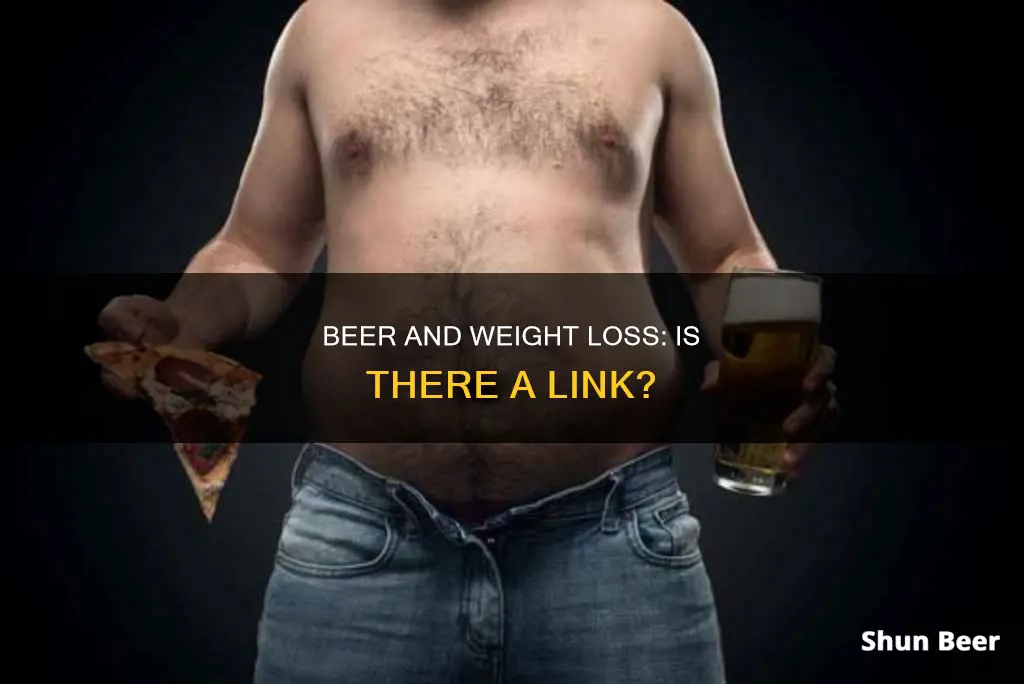
Drinking beer is deeply entrenched in our culture as a way to relax and have fun. However, it is also associated with weight gain and the infamous beer belly. So, does not drinking beer help with weight loss? The answer is yes, but it is not the only factor. Weight loss depends on the total calorie intake and creating a caloric deficit, which can be achieved by reducing alcohol consumption, eating fewer calories, or increasing physical activity. Beer is a concentrated source of calories with little nutritional value, and its negative impact on sleep and self-control can also contribute to weight gain. Therefore, cutting out beer can be an effective way to reduce calorie intake and promote weight loss, especially when combined with other healthy lifestyle changes.
What You'll Learn

Beer is an empty calorie as it provides almost no nutrients
Beer is an empty calorie drink as it provides almost no nutrients and is composed primarily or solely of calorie-rich macronutrients. In other words, it contains little to no micronutrients, fibre, or protein. While beer does contain some trace vitamins and minerals, these can be sourced from elsewhere in your diet.
The term "empty calories" refers to foods and beverages that are high in calories but offer little to no nutritional value. Alcoholic drinks, including beer, fall into this category. Beer is made through the fermentation of starches and sugars, which are significant sources of empty calories. On average, these sugars contain the same amount of calories per gram as pure fat.
The refining processes used to make modern beers have stripped them of most nutritional value. As a result, beer provides a high number of calories per pint, with a 12-ounce serving of regular beer containing around 150 calories.
The high caloric content of beer, coupled with its lack of essential nutrients, means that it can contribute to weight gain and malnutrition if consumed in excess. Alcoholic drinks, in general, have a lot of calories, even those considered healthier, such as spirits.
While moderate drinking is generally defined as 1-2 drinks per day for men and up to one drink for women, excessive alcohol consumption can lead to an unhealthy diet and weight gain. Therefore, it is important to be mindful of your total calorie intake and ensure it aligns with your weight management goals.
Arnold's Post-Workout Beer: Fact or Fiction?
You may want to see also

Beer is a liquid, meaning calories are consumed quickly
Beer is mostly water, and drinking it means you are consuming calories very fast. Beer is an "empty calorie" drink, providing almost no nutrients. A typical beer has 150 calories, and if you have several in one sitting, you can end up with a serious calorie overload. Two beers a day, the recommended limit for men, is an extra 300 calories a day, or 2,100 calories a week—the equivalent of nearly a whole extra day’s worth of eating.
If you drink five beers, that's around 750 calories, and you will still have room in your stomach for a full meal right after. This is why drinking beer can make losing weight difficult.
If you are trying to lose weight, it is harder to create a calorie deficit if you drink every day. However, you can still enjoy a beer from time to time and lose weight. Drink light or low % ABV beer, reduce your portion size, and drink less frequently.
The Beer Hall Putsch: What If It Succeeded?
You may want to see also

Alcohol is metabolised differently to other macronutrients
Alcohol is metabolised differently from other macronutrients. When you drink alcohol, your liver burns it instead of fat. This is because your body treats alcohol as a toxin, so it works extra hard to get it out of your system. This means that your body stops burning stored carbohydrates and instead focuses on burning off the alcohol.
Alcohol is also an "empty calorie" as it provides almost no nutrients. It is also in liquid form, which means you can drink calories very quickly. Alcohol contains around 2.5 calories per gram, making it a close runner-up in calories to carbohydrates and protein.
Beer is primarily water by weight and volume, but it is the alcohol content that contributes most of the calories. The higher the ABV, the higher the calories. A typical beer has around 150 calories, and if you drink several in one sitting, you can end up with a serious calorie overload.
Non-Alcoholic Beer: Safe to Drink While Driving?
You may want to see also

Alcohol can negatively affect sleep
Alcohol interacts with several neurotransmitter systems that are important in regulating sleep. It acts as a sedative, initially decreasing sleep onset latency and causing changes in sleep architecture early in the night when blood alcohol levels are high. However, later in the night, once the body has metabolized the alcohol, you're likely to experience more fragmented and disrupted sleep. This is because alcohol causes alterations in the sleep cycle, including more deep sleep and less REM sleep than usual.
Long-term alcohol use can result in chronic sleep problems and disorders like sleep apnea. It can also interfere with circadian rhythms, which are biological patterns that operate on a 24-hour clock. Alcohol may decrease the body's sensitivity to cues like daylight and darkness, which are crucial for the sleep-wake cycle.
To avoid sleep disruptions, experts recommend avoiding alcohol at least three hours before bed. This timeframe may need to be longer for some individuals, especially if they consume multiple drinks over a short period, drink on an empty stomach, or are particularly sensitive to alcohol's effects.
Beer Overconsumption: When Does It Become a Problem?
You may want to see also

Beer may cause you to eat more food
Drinking beer is often associated with an increase in body fat, particularly around the belly, otherwise known as a "beer belly". However, it is not necessarily the beer itself that causes this weight gain, but the fact that drinking alcohol can increase your appetite, leading to an increase in food intake.
Apéritif Effect
There are several studies suggesting that alcohol intake before a meal stimulates appetite and increases food intake later on in the meal. Researchers call this the "apéritif effect". In one study on 24 healthy men, researchers found that consuming an alcoholic beverage before lunch led to an 11% increase in total food intake during the meal, and a 24% increase in high-fat savoury foods. Another study found that women who were administered alcohol intravenously ate an average of 7% more food during their meal than women who were given a placebo.
Alcohol and Appetite
There are many reasons why alcohol may influence food intake and appetite. Firstly, there is a learned association between drinking and eating. Alcohol also amplifies appetite perception and reduces satiety signalling, through mechanisms involving the digestive tract, the endocrine system, and the brain. For example, researchers believe alcohol influences hormones related to satiety, like leptin and grehlin, and that it may impact neurobiological pathways that involve neurotransmitters like serotonin and GABA.
Calorie Intake
Beer contains as many calories as a soft drink, so it can add a lot of calories to your diet. Studies have shown that drinking alcohol can increase your appetite in the short term, causing you to eat more than you otherwise would. Furthermore, people don’t always compensate for the calories they consume from alcohol by eating less of other foods. This means that drinking beer regularly could contribute a significant number of calories to your diet.
Fat Burning
Drinking alcohol can prevent your body from burning fat. This is because your body prioritises the breakdown of alcohol over other sources of fuel, including stored fat. In theory, regular drinking could therefore contribute to an increase in body fat. However, studies examining this have found mixed results. Over the long term, drinking beer regularly but moderately in portions of less than 17 ounces per day doesn’t seem to lead to an increase in body weight or belly fat. Nevertheless, drinking more than that could lead to significant weight gain over time.
Beer and Thrush: Is There a Connection?
You may want to see also
Frequently asked questions
Yes, not drinking beer can help with weight loss. Beer is a concentrated source of calories and has little nutritional value. A 12-ounce serving of regular beer has 153 calories, while a light beer has 103 calories. Cutting out beer reduces your caloric intake and can help create a calorie deficit, which is necessary for weight loss.
The amount of weight lost by not drinking beer depends on various factors, including your initial drinking habits, lifestyle changes, and other factors. For example, if you drink two 12-ounce servings of regular beer daily, you can save around 300 calories per day, resulting in a weight loss of about 2.5 pounds per month.
Not drinking beer can improve your sleep quality, enhance your skin health, boost your immune system, and reduce the risk of related health issues, such as high blood pressure and cardiovascular disease.
Yes, if you want to continue drinking beer while losing weight, consider the following strategies:
- Drink light or low % ABV beer.
- Reduce your portion size by using smaller glasses or opting for cans instead of bottles.
- Drink less frequently, such as only on weekends.
- Choose lower-carb beers.
- Consciously adjust your eating habits by opting for lean protein sources and vegetables when drinking beer with your meal.
A "beer belly" is typically associated with consuming too many calories, whether from alcohol, sugary beverages, or oversized portions of food. Alcohol intake is linked to larger waistlines because when you drink, your liver burns alcohol instead of fat. Beer is also blamed because it is easy to consume excess calories from alcohol.







